Infected blood scandal LIVE: Rishi Sunak apologises on 'day of shame' after worst NHS treatment disaster
Prime Minister Rishi Sunak has apologised to the victims of the infected blood scandal and their families.
It comes after an an inquiry into the biggest treatment disaster in the NHS concluded the scandal "could largely have been avoided" and there was a "pervasive" cover-up to hide the truth.
Mr Sunak told the Commons: “This is a day of shame for the British state.
“Today’s report shows a decades long moral failure at the heart of our national life – from the National Health Service to the civil service, to ministers in successive governments, at every level the people and institutions in which we place our trust failed in the most harrowing and devastating way.
“They failed the victims and their families and they failed this country.”
He promised to pay “comprehensive compensation” to those affected and infected during the scandal.
“Whatever it costs to deliver this scheme, we will pay it,” he added, saying details would be set out on Tuesday.
Deliberate attempts were made to conceal the disaster, including evidence of Whitehall officials destroying documents, the Infected Blood Inquiry found.
Patients were knowingly exposed to unacceptable risks of infection, the probe found.
The 2,527-page report published on Monday documents a "catalogue of failures" which had "catastrophic" consequences, not only among people infected with contaminated blood and blood products, but also their loved ones.
More than 30,000 people were infected with deadly viruses while they were receiving NHS care between the 1970s and 1990s, in a disaster described by inquiry chairman Sir Brian Langstaff as a "calamity".
Sir Brian said "the scale of what happened is horrifying", with more than 3,000 people dead as a result and survivors battling for decades to uncover the truth.
Kate Burt, chief executive of the Haemophilia Society, said: "This report vindicates the long-held beliefs of survivors that the Government hid the truth to protect itself and to save money. The tragic truth is that many of the infections could and should have been prevented."
Follow latest updates below.
Live coverage ends for the day
20:45 , Matt Watts
We are pausing our coverage of the report into the infected blood scandal published on Monday.
You can read our report on Rishi Sunak and NHS England’s apology over the scandal here.
The findings of the report are covered in detail here.
This report covers the heartbreaking reaction of victims’ families to the report findings.
NHS England chief: Tens of thousands were badly let down
19:34 , Anthony France
NHS England chief executive Amanda Pritchard has issued an apology to victims of the infected blood scandal on behalf of the health service in England.
She said in a statement: “Earlier today, the Infected Blood Inquiry published its final report. The Prime Minister has subsequently issued an apology on behalf of successive Governments and the entire British state. I want to do the same on behalf of the NHS in England now, and over previous decades. Today’s report brings to an end a long fight for answers and understanding that those people who were infected and their families, should never have had to face.
“We owe it to all those affected by this scandal, and to the thorough work of the Inquiry team and those who have contributed, to take the necessary time now to fully understand the report’s conclusions and recommendations. However, what is already very clear is that tens of thousands of people put their trust in the care they got from the NHS over many years, and they were badly let down.
“I therefore offer my deepest and heartfelt apologies for the role the NHS played in the suffering and the loss of all those infected and affected.
“In particular, I want to say sorry not just for the actions which led to life-altering and life-limiting illness, but also for the failures to clearly communicate, investigate and mitigate risks to patients from transfusions and treatments; for a collective lack of openness and willingness to listen, that denied patients and families the answers and support they needed; and for the stigma that many experienced in the health service when they most needed support.
“I also want to recognise the pain that some of our staff will have experienced when it became clear that the blood products many of them used in good faith may have harmed people they cared for.
“I know that the apologies I can offer now do not begin to do justice to the scale of personal tragedy set out in this report, but we are committed to demonstrating this in our actions as we respond to its recommendations.”
Campaigner: Blood scandal report is ‘finally the truth’
18:28 , Anthony France
Dame Diana Johnson who has fought for compensation for victims told MPs: “Finally the truth.
“It’s a vindication of the nearly 50 years of campaigning for justice.”
She paid tribute to all those affected, who lost their lives and the two people dying on average every week.
Theresa May: Abject failure of the British state
18:10 , Anthony France
Conservative former prime minister Theresa May told the Commons: “Sir Brian Langstaff’s report today has finally uncovered the truth of this appalling tragedy which has affected the lives of so many and so many have been fighting, as the Prime Minister and the Leader of the Opposition said, for decades to get to this point.
“Sir Brian has highlighted what is a devastating and abject failure of the British state. Medical professionals, civil servants, politicians – all of whom felt their job was to protect their own reputation rather than to serve and look after the public who they were there to serve.
“As we rightly today remember all the victims of this terrible tragedy, will (Rishi Sunak) commit himself unashamedly to working to ensure that all those in Government – politicians and civil servants – recognise that their job is to serve the public and not to protect themselves?”
Rishi Sunak acknowledged Mrs May launched the inquiry during her time as prime minister, adding the Government will “study every single one” of the inquiry’s recommendations in detail and “work urgently across government and public organisations” to ensure “nothing like this can ever happen again”.
He added: “But also that we end the challenges that she encountered, where the institutions responsible for serving the public, including the NHS and civil service, are more concerned by cost than accountability.”
SNP leader: Scandal represents very worst of Westminster
18:04 , Anthony France
SNP Westminster leader Stephen Flynn told the Commons: “This scandal represents the very worst of Westminster. Decades of deflection, decades of denial and of course decades of deceit.”
Mr Flynn, in remarks to the victims, said: “First is an apology. I’m incredibly sorry that this happened to you.
“Second is to say quite openly thank you. Thank you for your determination and your desire, for being able to pry open the doors of this place and ensure that your voices were heard by all of us. We would not be here today without your efforts.
“And thirdly it’s to say to the victims that I can assure you we will do everything we can to ensure that the Government implements the recommendations as laid out today.”
He said the SNP will work with Prime Minister Rishi Sunak and future governments to ensure the compensation “promise is swiftly kept”.
Sir Sajid Javid: Public servants put themselves above patient safety and care
18:01 , Anthony France
Former health secretary Sir Sajid Javid said the infected blood scandal is “the biggest in the history of the NHS” and accused public servants of “putting the reputation of themselves, and the NHS above that of patient safety and care”.
He added: “Time and time again minister have stood at that despatch box, under successive governments including myself, promising that lessons will be learned. So can I ask (Rishi Sunak) why will it be any different this time?”
Prime Minister Rishi Sunak replied: “Sir Brian’s report is categoric that this scandal represents a decade-long moral failure of the state. But in particular, he highlights an appalling truth, that our national health service failed. It was known that blood and blood products given by medical professionals were contaminated.
“It is correct to acknowledge that medical practice has evolved. Every day hundreds of thousands of our NHS staff do provide lifesaving care to the British people and we are incredibly grateful, but the report today sets out clear and wide-ranging recommendations that we must study closely and we will work urgently with our health services to ensure that nothing like this will ever happen again.”
Sir Keir Starmer highlights case of Londoner Mark Stewart in Commons
17:58 , Anthony France
Sir Keir Starmer highlighted the case of Holborn and St Pancras constituent Mark Stewart who was given Factor VIII in the 1980s as part of a clinical trial, noting: “As was his father, as was his brother. All three subsequently contracted hepatitis C but only Mark remains with us today.
“And then over the decades as Mark and so many like him searched for truth and justice, the British state ignored them. The truth, as Sir Brian says today, was hidden from them for decades.
“And that is why this is one of the gravest injustices this country has seen and yet we have to be honest: this scandal is not unique and the institutional defensiveness identified by Sir Brian is a pattern of behaviour that we must address.
“Because while Mark may never get his brother, his father or his health back, for all the families affected we must restore the sense that this is a country that can rectify injustice – particularly when carried out by institutes of the state.
“That is our job today, this week and beyond. Frankly, it is the very least that we owe.”
Rishi Sunak, in his reply, said: “The anger and sorrow felt across this House is the right response and it’s right we now act on behalf of the victims, their loved ones and the whole community who expect us to put right this historic wrong.”
Damning infected blood inquiry findings explained in the Standard podcast
17:58 , Matt Watts
The Standard's health reporter Daniel Keane has been speaking to the Standard podcast to discuss the findings of the infected blood inquiry.
Dan explains the devastating revelations from the final inquiry report and why the findings are so damning.
Sir Keir Starmer welcomes Sunak’s confirmation that compensation will be paid
17:48 , Anthony France
Labour leader Sir Keir Starmer said he welcomed Rishi Sunak’s confirmation that compensation will be paid, adding: “He should be under no doubt whatsoever that we will work with him to get that done swiftly.
“Because make no mistake the victims in this scandal have suffered unspeakably, thousands of people have died, they continue to die every week, lives completely shattered, evidence wilfully destroyed, victims marginalised, people watching their loved ones die, children used as objects of research – on and on it goes.
“The pain barely conceivable and so as well as an apology, I also want to make clear we commit that we will shine a harsh light upon the lessons that must be learned to make sure nothing like this ever happens again.”
Sir Keir Starmer pays tribute to blood scandal victims
17:45 , Anthony France
Sir Keir Starmer has apologised to victims of the infected blood scandal and said politicians’ failure to protect them “applies to all parties” including Labour.
He told the Commons: “This response can only begin in one place, because this is an injustice that has spanned across governments, on an unprecedented scale and collectively, we failed to protect some of the most vulnerable in our country.
“And so, as well as paying tribute to the courage and determination of the victims, the infected and the affected, some of whom are here in the gallery today, I want to acknowledge to every single person who has suffered that in addition to all of the other failings, politics itself failed you.
“That failure applies to all parties, including my own. There is only one word, sorry.
“And by that apology, I acknowledge that this suffering was caused by wrongdoing, delay and systemic failure across the board, compounded by institutional defensiveness and Sir Brian Langstaff makes clear in his report, any apology today must be accompanied by action.”
Sir Keir Starmer: Politics failed the blood scandal victims
17:43 , Anthony France
Labour leader Sir Keir Starmer said “some of the most vulnerable in our country” were failed and unprotected.
“Politics itself failed you,” Sir Keir told the Commons.
“That includes my own party. There is only one word - sorry.
“This scandal is not unique.
“The institutional defensiveness is a pattern of behaviour we must address.”
Rishi Sunak promises to pay “comprehensive compensation”
17:37 , Anthony France
Rishi Sunak promised to pay “comprehensive compensation” to those affected and infected by the scandal.
“Whatever it costs to deliver this scheme, we will pay it,” he added, saying details would be set out on Tuesday.
Sunak apologised to the victims of the infected blood scandal.
He told the Commons: “I want to make a whole-hearted and unequivocal apology for this terrible injustice.
Prime Minister Rishi Sunak speaks directly to victims and their families on the infected blood scandal. pic.twitter.com/zrwTpSquYq
— UK Prime Minister (@10DowningStreet) May 20, 2024
“First to apologies for the failure in blood policy and blood products, and the devastating and so often fatal impact its had on so many lives, including the impact of testaments that were known or proved to be contaminated, the failure to respond to the risk of imported concentrates, the failure to prioritise self-sufficiency in blood, the failure to introduce screening services sooner, and the mismanagement of the response to the emergence of Aids and hepatitis viruses amongst infected blood victims.
“Second to apologise for the repeated failure of the state and our medical professionals to recognise the harm caused. This includes the failure of previous payment schemes, the inadequate levels of funding made available and the failure to recognise hepatitis B victims.
“And third, to apologise for the institutional refusal to face up to these failings and worse to deny and even attempt to cover them up.”
Rishi Sunak: Failures amounted to a calamity.
17:31 , Anthony France
Rishi Sunak told MPs: “Sir Brian finds a catalogue of systemic, collective and individual failures – each on its own serious, and taken together amounting to a calamity.
“And the result of this inquiry should shake our nation to its core. This should have been avoided. It was known these treatments were contaminated, warnings were ignored repeatedly.
“Time and again people in positions of power and trust had the chance to stop the transmission of those infections. Time and again they failed to do so.”
Rishi Sunak told MPs: “Sir Brian finds an attitude of denial towards the risks of treatment.
“Worse, to our eternal shame in a way that it is hard to even comprehend, they allowed victims to become objects for research.”
PM Rishi Sunak: “This is a day of shame"
17:28 , Anthony France
Prime Minister Rishi Sunak began by telling the Commons: “This is a day of shame for the British state.”
He said the blood inquiry report revealed a “decade-long moral failure” from the NHS to the Civil Service and from ministers in successive governments.
Sunak adds report author Sir Brian Langstaff found “a catalogue of systemic failures”.
The inquiry “should shake our nation to its core”, he said adding: “Warnings were ignored repeatedly.
“Time and again people had the power to stop transmissions of infections.
“Time and again they failed.”
Rishi Sunak has started speaking in the Commons
17:18 , Anthony France
Rishi Sunak has started to speak in the Commons after an inquiry into the infected blood scandal identified a catalogue of failures
Victim calls for prosecutions
16:13 , Jacob Phillips
Mark Ward, 55, born with "severe" haemophilia, was co-infected with HIV and hepatitis C after receiving contaminated blood products and said he had been treated "terribly" over the years.
He called the report vindicating, telling PA: "Knowing that I've gone from being a troublemaker and conspiracy theorist and a liar to having a High Court judge say 'you were right', and now all those people out there who are on the wrong side of history, I shall be waiting for their apologies.
"They can come to me and us and say 'we're sorry'."
Mr Ward, who is an LGBT ambassador for The Haemophilia Society, said prosecutions need to happen.
He told PA: "I think justice has to be seen to be done and justice comes in many different forms.
"Yes, there's compensation. Yes, there should be an apology and I think it should be done properly, not just, you know, someone stand up and say, 'Oh, we're sorry' because everyone could just say that.
"But for me, prosecutions have to now happen, because the people who were responsible to care for the nation really failed so significantly and so many lives were lost unnecessarily.
"And they can't be allowed to just walk by go 'yeah, nice report' and disappear into the sunset, there has to be justice.
"And the only way justice can be done is people see that they have been punished for what they did."
'People were hiding things from us' says victim
16:03 , Jacob Phillips
A victim of the blood scandal has said the cover-ups highlighted in Sir Brian’s report were "disgraceful" and showed that victims had been "lied to".
Former IT consultant Rosamund Cooper, 50, was diagnosed with Von Willebrand disease, a bleeding disorder, when she was eight months old, and found out she had been infected with hepatitis C when she was 19.
Ms Cooper told PA: "I think one of the key things for me, which I have seen in what I've read so far is the complete lack of transparency, the lack of candour, the lack of people taking account for actions that have harmed people, so decisions were made, people were harmed, but that was not accepted, that was hidden.
"We were lied to about that - we were told it was accidental, we were told people didn't know when the decisions made were the best possible at the time.
"It's showing that that's not the case, and that people were covering things up, denying things, hiding things from us, which is disgraceful. That never needs to happen again."
Inquiry chair blasts 'unconscionable' testing on pupils at Treloar's school
15:24 , Lydia Chantler-Hicks
During his statement this afternoon, Sir Brian Langstaff said it was “unconscionable” that children at the Treloar’s school in Hampshire were treated in a way that “trumped safety” without the risks being explained to their parents.
“Of the 122 pupils with haemophilia who attended the school between 1970 and 1987 only 30 survive,” he said.
“The pupils were often regarded as objects for research rather than first and foremost as children whose treatment should be firmly focused on their individual best interests alone.
“There was a particularly heavy use of factor concentrates; different concentrates were indiscriminately used, increasing risk; pupils were given extra to see how prophylaxis might work; research prejudiced the quality of treatment; and convenience of administration trumped safety.
“Children were treated in this way without their parents having been provided with any (or anywhere near enough) information about the risks of treatment. It was unconscionable to treat children with concentrates capable of transmitting serious viruses without explaining those risks clearly to their parents.
“There were multiple research projects where informed consent for participation was neither sought nor given. This was unethical and wrong.”
Watch: Inquiry chair greeted with standing ovation as he arrives to deliver statement
15:13 , Lydia Chantler-Hicks
This is the powerful moment campaigners gave Sir Brian Langstaff a lengthy standing ovation, as he arrived to deliver a statement summarising the findings of his damning report.
Inquiry chair ends address to more thunderous applause
15:10 , Lydia Chantler-Hicks
Sir Brian’s address has now ended, and he left the stage to another thunderous round of applause and loud cheers.
He appeared moved as he paused for a moment and looked around at the audience, for what must for him too have been a poignant moment in the six-year report.
“Thank you,” he appeared to respond, before he left the stage.

'Too many have died', says Sir Brian as he ends powerful address
15:01 , Lydia Chantler-Hicks
Sir Brian is coming to the end of what has proven a powerful and moving summary of his report.
“I thank you all for your contribution to this inquiry,” he said. “The sheer numbers here lay testament to the importance of the issues this inquiry has been considering.”
“I would like to thank those who have contributed who would be here but can no longer be. Too many are too seriously ill as a result of their infections. Too many have died.”
He went on to highlight the story of the very many victims of the scandal.
“I will mention one person,” he said. “Perry Evans gave evidence on the first day of the inquiry in 2019. He had mild haemophilia.
“He was diagnosed with HIV in 1985, and survived HIV-related cancer. He died very sadly five weeks ago. His wife Heather is here today.”
'GPs should ask new patients about past transfusions to help find undiagnosed victims'
14:53 , Lydia Chantler-Hicks
“GPs should ask newly registered patients if they have had a blood transfusion to try and find those who have not been diagnosed,” said Sir Brian, regarding changes that should be made going forward.
“That is of course in addition to the free postal testing now available in England and Wales.”
'I fully expect the government to make an apology', says inquiry chair
14:48 , Lydia Chantler-Hicks
“In terms of what should happen next, well, I fully expect the government to make an apology,” said Sir Brian.
This was met with loud, sustained applause from the room.
“To be meaningful, though, that apology must explain what the apology is for,” he added, to more applause.
“It should recognise and acknowledge not just the suffering, but that the suffering was the result of wrongs done. It should provide vindication for those who have waited so long. And it should be accompanied by action.”
Documents were deliberately destroyed to hide the truth
14:45 , Lydia Chantler-Hicks
Documents were deliberately destroyed in an attempt to make the truth more difficult to reveal, said Sir Brian.“Documents which might have been thought to assist those seeking compensation went missing,” he said,
“In the case of some documents, it’s simply not possible to know now, how and why they went missing.
“For others, I have concluded that they were deliberately, wrongly destroyed in an attempt to make the truth more difficult to reveal.”
His comments were met with loud applause.
Civil service largely responsible for 'institutional defensiveness'
14:43 , Lydia Chantler-Hicks
“The failure to tell people the risk of treatments or tell patients that they had been infected with HIV or hepatitis…these failures were widespread and wrong,” said Sir Brian. “They were compounded by institutional defensiveness.Sir Brian went on to say: “Much of the responsibility for this institutional defensiveness lies with the civil service.
“It was not until 2003 that limited financial support was announced for people with hepatitis C from NHS blood products.
“Prior to then, the line taken by successive governments was that no financial support whatsoever should be provided.”
Scandal victims were not told about the impact of their treatment
14:36 , Lydia Chantler-Hicks
“Early on in the inquiry it became clear that people were not told about the impact of their treatment,” said Sir Brian.
“Giving people the knowledge of what is happening to their own body is a key cornerstone of medical treatment.”
Fewer deaths may have happened if UK had followed WHO guidance
14:35 , Lydia Chantler-Hicks
There could have been fewer deaths if the UK had followed World Health Organisation (WHO) guidance from 1952, the Infected Blood Inquiry said.
Sir Brian Langstaff said: “As long ago as 1952 the World Health Organisation identified how to reduce the risks of transmitting hepatitis through blood and blood products.
“UK medical and government advisors took a central part in this. There were four key measures highlighted by the World Health Organization on which, despite its involvement in identifying them, the United Kingdom fell short...
“The key point is that if we had followed the World Health Organization’s advice, there would have been fewer infections from blood and from blood products and fewer deaths.”
AIDS risk was known, but response was still 'unconscionably' slow
14:33 , Lydia Chantler-Hicks
“The real risk of blood products transmitting AIDS was known by doctors in 1982,” said Sir Brian.
“Yet the response was one of disbelief, dismissiveness and delay. The governments response was unconscionably slow.”
Scandal exacerbated by poor record-keeping
14:30 , Lydia Chantler-Hicks
“Poor record-keeping has been a problem for the inquiry,” said Sir Brian.
“If you cannot trace the source of infection back to the donor, you cannot treat the donor. Reporting new infections was not the priority it should have been.”
Inquiry chair criticises four-year delay in testing recipients for hepatitis
14:29 , Lydia Chantler-Hicks
Sir Brian has slammed the four-year delay between the roll-out of hepatitis tests, and their use to detect people who had been infected by blood donations.
He said one might assume that after the tests were introduced in September 1991, “donors who were infected and might not know about it would be tested and told, and that anybody who had been given suspect blood would be traced and checked”.
“But you would be wrong,” he said. “It took around four years for there to be a general look-back like this.”
He praised one Scottish transfusion director who “thought this was so unethical” that he arranged a look-back in his area, under the guise of a “pilot study”.
Inquiry chair tells how UK imported US paid-for blood, despite clear risks
14:25 , Lydia Chantler-Hicks
“Blood donors in the UK gave blood freely purely for the good of other people unknown to them,” Sir Brian has told the press conference.
“By contrast, the blood supplied in the United States was largely sold by people who needed the money.
“The hepatitis that gave rise to and the number of deaths that followed gave rise to the US health authorities banning sales of whole blood for transfusion in 1973.
“But the US authorities did not stop people selling their plasma to pharmaceutical companies, to be made into blood products.
“In 1973, the UK licensing authority gave the green light to the importation and distribution of an American blood product, and an Austrian blood product also made using paid donations, despite the manufacturers making no secrets of the risks of hepatitis they posed.
“The licensing authority knew of the risks of the sales of blood plasma from people who - I quote - ‘did not inspire confidence’, and were motivated by money.”
'Doctors know best' mentality put patients at risk, says inquiry chair
14:18 , Lydia Chantler-Hicks
“The picture is a complex one and the failings were multiple,” Sir Brian has told a press conference.
“Governments and doctors knew from the mid 1940s that blood could transmit hepatitis. And that this was a significant disease that could lead to liver cancer and death.
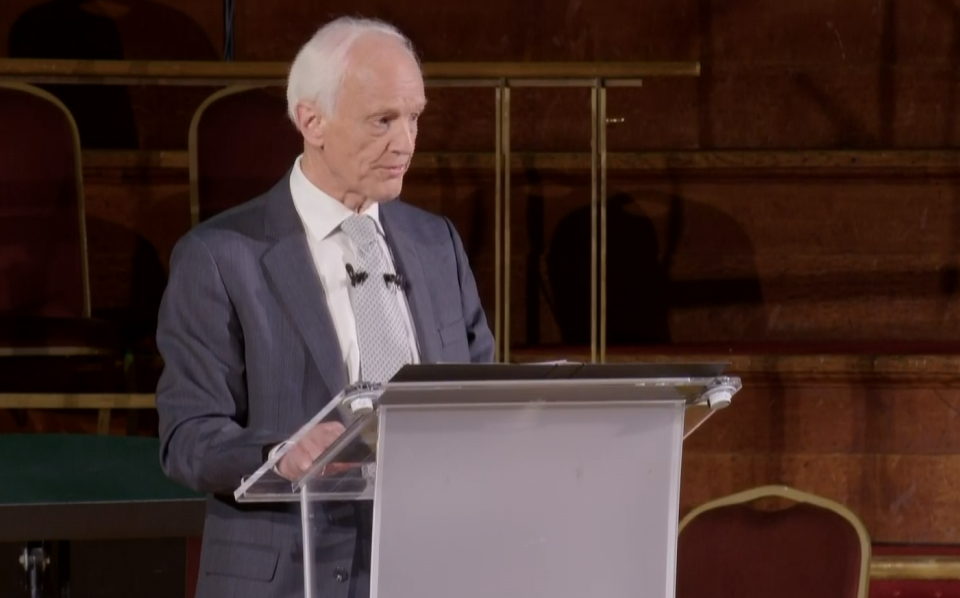
“This was not confined to the dusty libraries of academia… One of the leading transfusion directors used to write on the board for students: ‘blood can kill’.
“The infections happened because those in authority did not put patient safety first… ‘doctors know best’ was such a pervasive belief that the risks of blood transfusion was overlooked.”
Government repeatedly lied to victims, says Sir Brian Langstaff
14:14 , Lydia Chantler-Hicks
“This disaster was not an accident,” said Sir Brian. “People put their faith in doctors and the government to keep them safe, and their trust was betrayed.”
“The NHS and successive governments have compounded the agony by refusing to accept that wrong had been one.
“More than that, the government repeatedly maintained that people received the best available treatment, and that testing of blood donations began as soon as the technology was available. And both claims were untrue.”
Evidence has been difficult to listen to, says inquiry chair
14:10 , Lydia Chantler-Hicks
“The evidence has been difficult to listen to, but it is much harder still for those recounting their experiences,” Sir Brian Langstaff has told a press conference.
“This brought back memories they wish they had forgotten… but they did it because the truth matters.
“Children witnessed the decline and death of both parents and their lives were altered as a result.”
Inquiry chair greeted with minute-long standing ovation
14:08 , Lydia Chantler-Hicks
Sir Brian Langstaff has just arrived to give his statement on the inquiry, and has been greeted with a standing ovation and cheers that lasted more than a minute.
“If that’s for me or for my remarkable team, thank you,” he said, followed by more applause.
“But you’re actually applauding the wrong people. This is your report.
“I may have done the words, certainly the errors, the omissions are all mine...but the words come from you, and your stories.
“I want you please in a moment to give me an applause at least as long, or even longer, standing please if you can, to those really responsible for what is in this report.”
He then led another lengthy round of applause, as he gazed around at the packed auditorium.
Campaigners pictured outside Central Hall in Westminster as inquiry chair due to give press conference
14:00 , Lydia Chantler-Hicks
We’ll be hearing a statement from inquiry chair Sir Brian Langstaff any minute.
We’ll be bringing you all the latest updates as he gives his speech, which you can also watch live at the top of this page.
Meanwhile, emotional campaigners have been pictured outside Westminster’s Central Hall, wearing t-shirts and carrying posters bearing the photos of victims of the infected blood scandal.
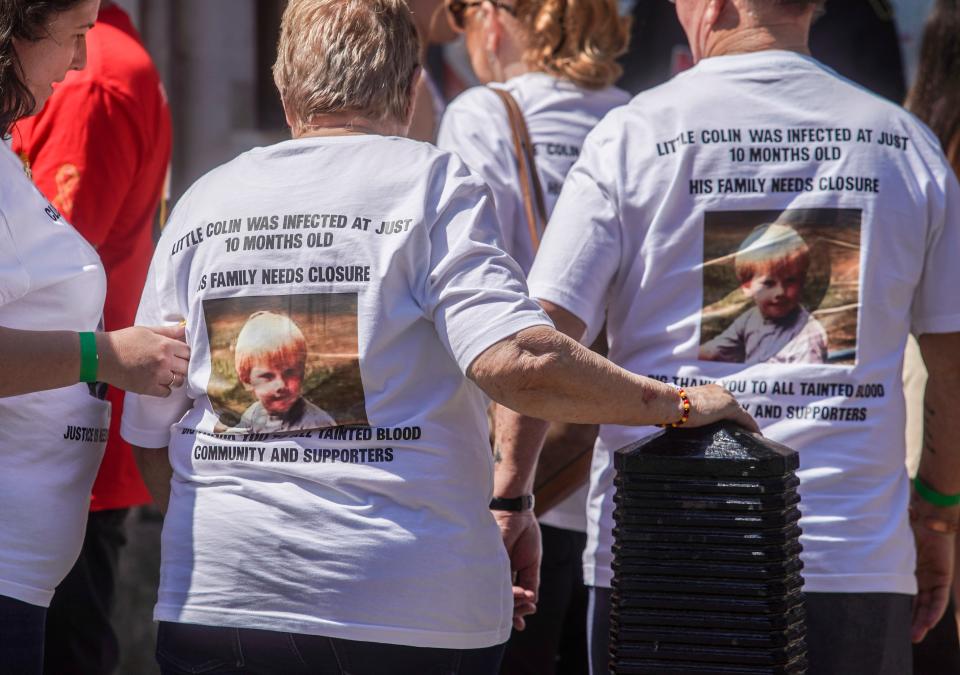
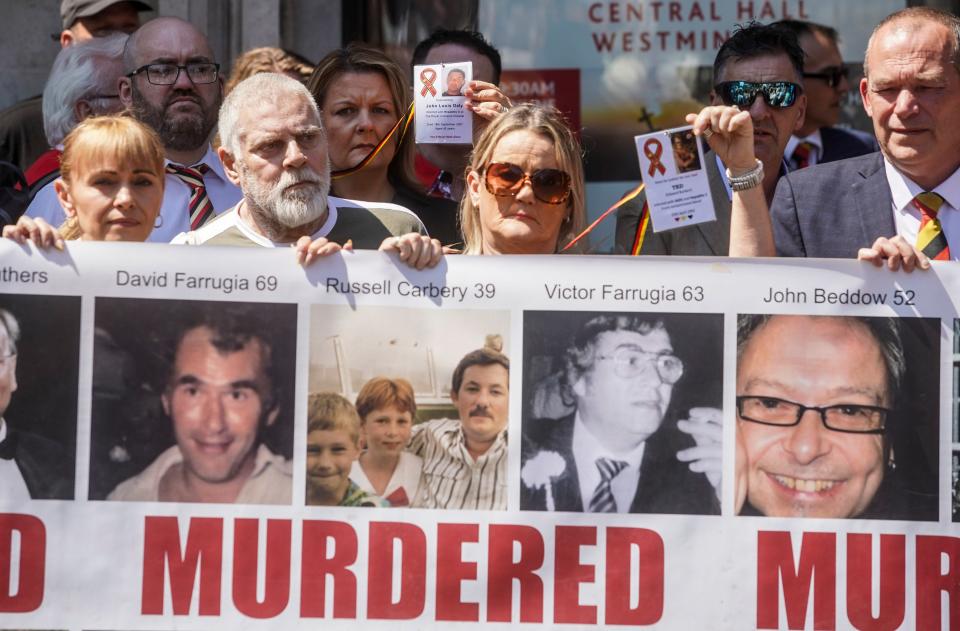
There is a feeling of closure but we worry report's recommendations will be ignored, says campaigner
13:50 , Lydia Chantler-Hicks
Lynne Kelly, chairperson of Haemophilia Wales, has just told a press conference that the Infected Blood Inquiry's report made victims of the scandal “now feel that they are believed”.
“There is a feeling of closure,” she said. “The difficulty is that no one can bring back the people that have been lost.
“People are learning that this could have been avoided…that troubles them immensely.
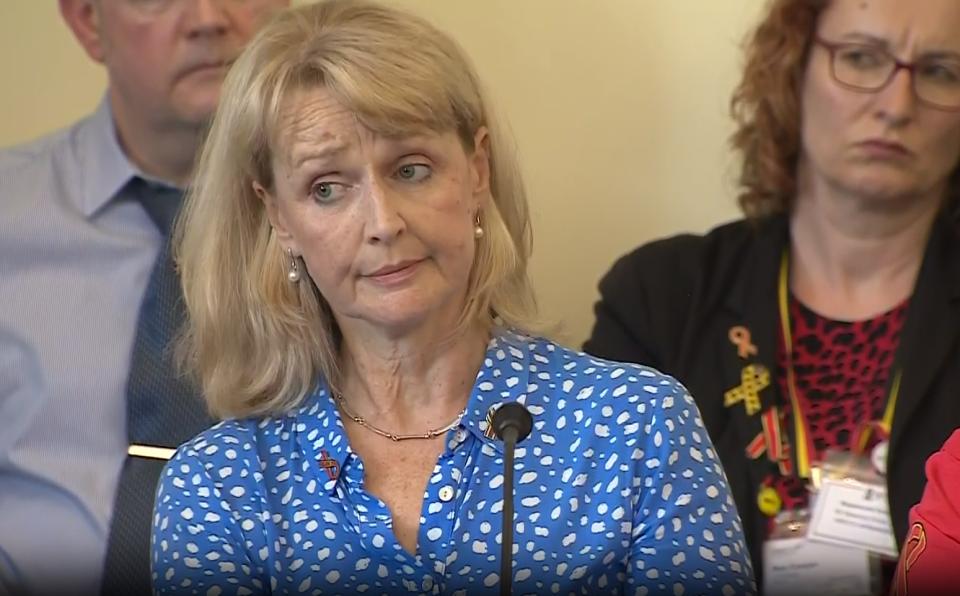
“We know that a compensation package will be announced tomorrow but we still don’t know the details of it.
“The worry is that Sir Brian’s recommendations could be ignored by the Government. People are reticent because they’ve seen what happens in the past.”
Photos show emotional campaigners responding to damning report
13:41 , Lydia Chantler-Hicks
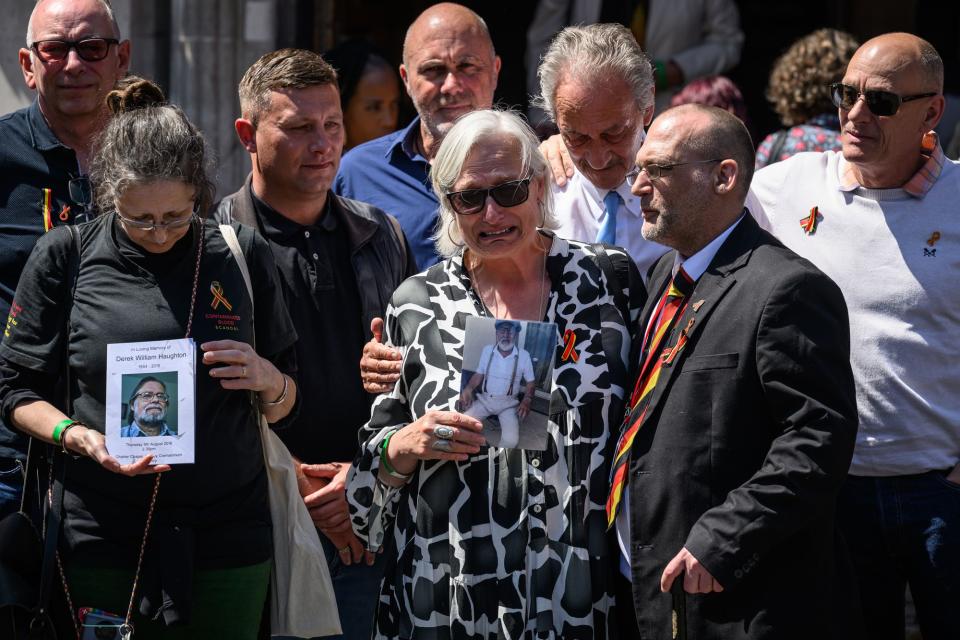
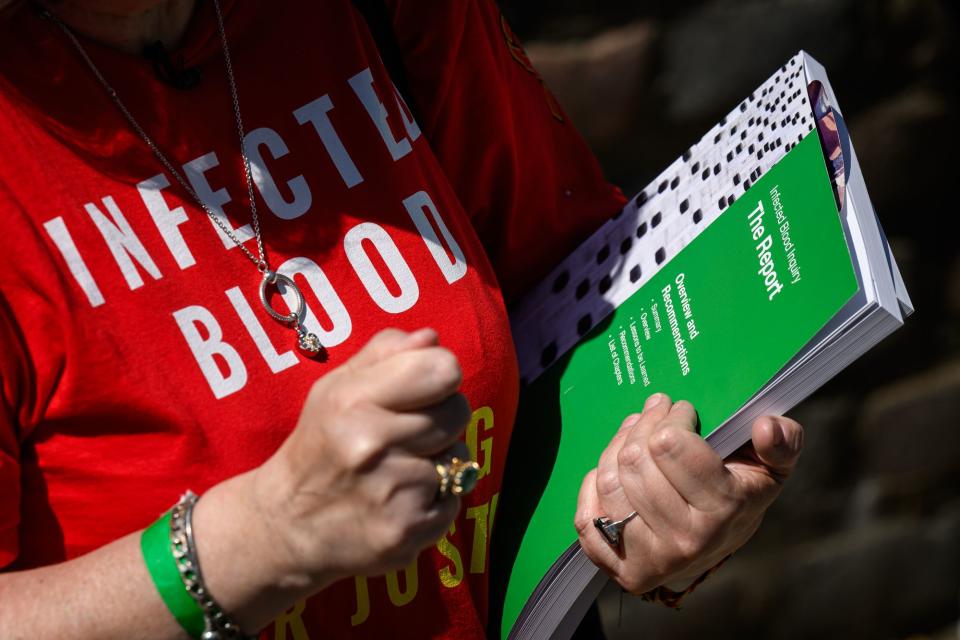
What are haeomophilia, and Factor VIII?
13:35 , Lydia Chantler-Hicks
We have heard a lot about haeomophilia today.
Haemophilia is an inherited disorder, in which the blood does not clot properly.
Most people with the condition have a shortage of the protein that enables human blood to clot, known as Factor VIII.
In the 1970s, a new treatment was developed – factor concentrate – to replace the missing clotting agent, which was made from donated human blood plasma.
A key failure highlighted in today’s report is that instead of ensuring a sufficient supply of UK-made treatments for haemophilia, the NHS continued to import factor concentrate from the US – where manufacturers paid high-risk donors, including prison inmates and drug users.
Second campaigners' press conference about to start
13:32 , Lydia Chantler-Hicks
We are about to hear from a number of other Infected Blood Inquiry campaigners, at a second press briefing. We’ll be bringing you the key lines from that.
At 2pm, inquiry chair Sir Brian Langstaff is due to then give a televised statement on the report. You’ll be able to watch that live on this page.
Infected blood disaster was no accident, says inquiry chair Sir Brian Langstaff
13:18 , Lydia Chantler-Hicks
“What I have found is that that disaster was so accident,” said chairman of the Infected Blood Inquiry, Sir Brian Langstaff.
“People put their trust in doctors and in the government to keep them safe, and that trust was betrayed.
“And then the government compunded their agony, by telling them that nothing wrong had been done, that they had had the best possible treatment...
“That’s why what I’m recommending is that compensation must be paid now, and I’ve made various other recommendations to help to make the future of the NHS better, and treatment safer.”
'So many people will not see justice' say victims of blood scandal
13:07 , Jacob Phillips
Slow progress on the infected blood scandal means that many of those responsible will never see justice, victims of the disaster said.
The Haemophilia Society chairman Clive Smith said: "One of the aspects that sadly, the delay has caused, is the fact that there are doctors out there who should have been prosecuted for manslaughter, gross negligence manslaughter, doctors who were testing their patients for HIV without consent, not telling them about their infections.
"Those people should have been in the dock for both gross negligence manslaughter. And sadly, because of the delay, that's one of the consequences that so many people will not see justice as a result."
Andy Evans, chairman of the Tainted Blood campaign group, added: "This has gone on for so long now that people that were around at the time will be very hard to track down if they're even still alive."
The delay "really is in this case, justice denied," he said.
Inquiry chair is saying ‘I don’t trust you’ to government
13:05 , Jacob Phillips
Chairman of The Haemophilia Society Clive Smith has called for the government to follow the recommendations of the “unprecedented” report.
He told a press conference: “What the chair of the public inquiry is saying to government is ‘I don’t trust you’ and that is what the community has said for decades.
“I believe there should be a presumption that recommendations from inquiries should be implemented unless the government can provide good reasons why not.
“Why is it that we continue to have these burning injustices? Why is it in the United Kingdom that we continue to have these scandals? It is because we ignore the recommendations of public inquiries and that must stop today.”
Politicians 'should hang their heads in shame'
12:58 , Jacob Phillips
Many politicians "should hang their heads in shame," Clive Smith, chairman of The Haemophilia Society, said.
He told a press conference: "No single person is responsible for this scandal. It's been the result of generations of denial, delay and cover-up.
"And whilst there might be an apology later today from the Prime Minister, it's not just the Prime Minister who holds responsibility and accountability for this.
"There are many others out there, and I would expect over the coming days and weeks for many more people to come forward and say 'sorry, I'm sorry for my part'. And if they're genuinely sorry they will help implement the recommendations that Sir Brian has recommended today."
Andy Evans, chairman of the Tainted Blood campaign group, added: "Any apologies that we've had in the past have been meaningless because all they said is this should never have happened. We know that this should never have happened.
"What was your part in it? What are you sorry for? That's what the community needs to hear before we can even begin to get closure on this."
Report reveals deliberate decision to destroy Department of Health files
12:57 , Jacob Phillips
The report said there was a deliberate decision to destroy Department of Health files which contained material dealing with delays in the introduction of screening blood donations for hepatitis C.
The files, which related to decision-making of the Advisory Committee on the Virological Safety of Blood (ACVSB), were marked for destruction in 1993.
"The destruction was not an accident, nor the result of flood, fire or vermin," Sir Brian wrote.
"The immediate reason for destruction was human choice. Someone, for some reason, had chosen to have those documents destroyed."
He said: "It is an uncomfortable conclusion that it is more likely than not that a civil servant chose to destroy the documents because they were those documents: but if that is what the evidence amounts to, it is the conclusion that must follow.”
There was a 'subtle, pervasive and chilling' cover up of the infected blood scandal
12:56 , Jacob Phillips
There was a "subtle, pervasive and chilling" cover-up of the infected blood scandal, according to the final report from the long-running inquiry.
The final report of the Infected Blood Inquiry, published on Monday, found there has been "deliberate destruction" of relevant documents.
Chairman of the inquiry, Sir Brian Langstaff, said in the report: "Standing back, and viewing the response of the NHS and of government overall, the answer to the question 'was there a cover-up' is that there has been.
"Not in the sense of a handful of people plotting in an orchestrated conspiracy to mislead, but in a way that was more subtle, more pervasive and more chilling in its implications.
"In this way there has been a hiding of much of the truth."
People who put their trust in doctors and government were 'betrayed'
12:55 , Jacob Phillips
Inquiry chairman Sir Brian Langstaff said that the contaminated blood disaster is "no accident" and that people who put their trust in doctors and the government were "betrayed".
He told broadcasters: "What I have been looking at are people from families across the UK who have gone into hospital for treatment and over 30,000 have come out with infections which were life-shattering.
"And 3,000 of those have died and deaths keep on happening week-by-week. What I have found is that disaster was no accident. People put their trust in doctors and the government to keep them safe and that trust was betrayed.
"Then the government compounded that agony by telling them that nothing wrong had been done, that they'd had the best available treatment and that as soon as tests were available they were introduced and both of those statements were untrue.
"That's why what I'm recommending is that compensation must be paid now and I have made various other recommendations to help make the future of the NHS better and treatment safer."
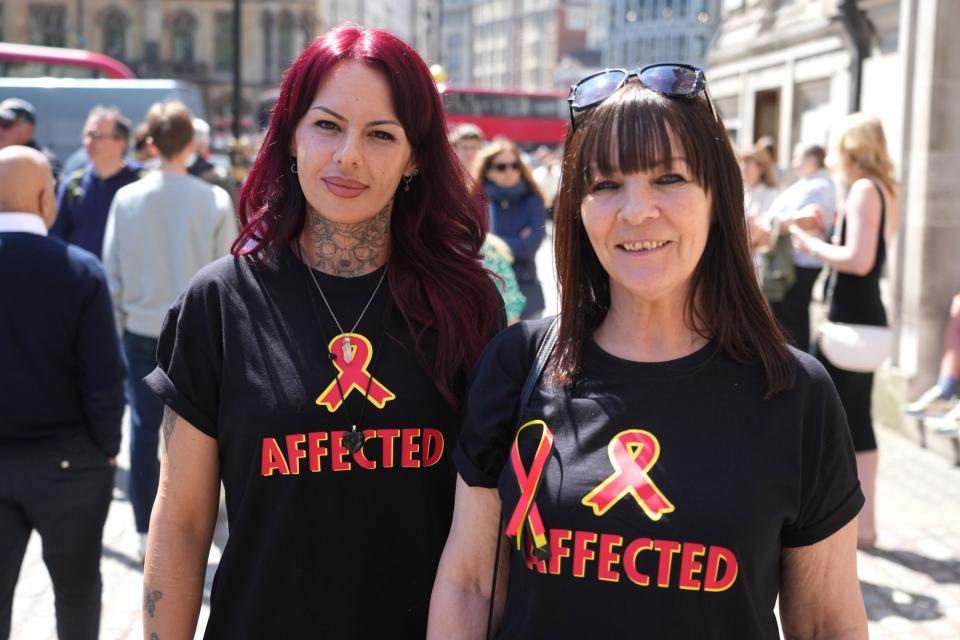
Victims 'validated and vindicated' following report findings
12:48 , Jacob Phillips
Victims of the contaminated blood scandal said they felt "validated and vindicated" by the inquiry's final report into the scandal.
Andy Evans, chairman of the Tainted Blood campaign group, told a press conference that it was a "momentous day".
"Sometimes we felt like we were shouting into the wind during the last 40 years...
"Today proves that it can happen in the UK and I just feel validated and vindicated by Sir Brian and his report today."
Contaminated blood disaster 'still happening' says Sir Brian Langstaff
12:43 , Jacob Phillips
Publishing the final report of the Infected Blood Inquiry, chairman Sir Brian Langstaff said that the contaminated blood disaster is "still happening" because patients who suffered "life-shattering" infections continue to die every week.
He added: "The scale speaks for itself, if you have over 30,000 people who go into hospital and come out with infections which were life-shattering that in itself is huge and the suffering for them and others is huge.
"When you add that the fact that over 3,000 have died and deaths keep on happening week after week, you not only have a disaster that has happened over years but is still happening.
"What that brings with it is suffering which is very difficult to put into words, you really have to listen to people who have lived with it to hear and understand."
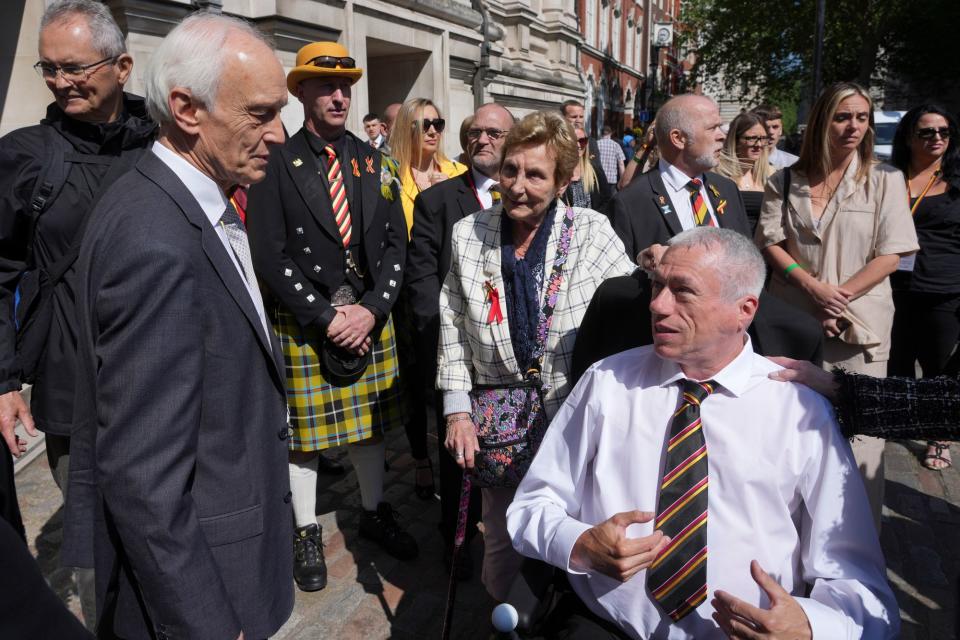
Infected blood victims knowingly exposed to 'unacceptable' risks, scathing report reveals
12:38 , Jacob Phillips
Tens of thousands of patients were “knowingly exposed to unacceptable risks of infection” in biggest treatment scandal in NHS historyThe biggest treatment scandal in NHS history could have been largely prevented but the truth was hidden for decades by a Whitehall cover-up and a litany of other failures, the scathing report found.
The long-awaited Infected Blood Inquiry’s report told in withering terms how tens of thousands of patients were “knowingly exposed to unacceptable risks of infection” from the 1970s into the early 1990s with “shattering” impacts on their lives.
People were “cruelly” told they were getting the best treatment available and ministers refused to take responsibility to “save face”.
Read the full story here.
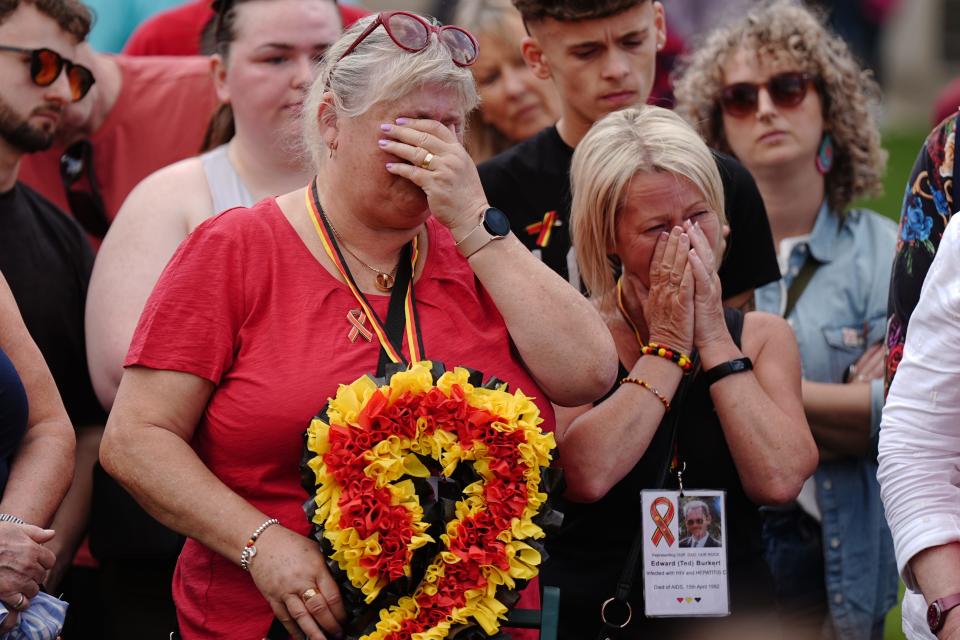
Blood scandal was a 'catalogue of failures'
12:33 , Jacob Phillips
The just-published 2,527-page report documents a "catalogue of failures" which had "catastrophic" consequences, not only among people infected with contaminated blood and blood products, but also their loved ones.
More than 30,000 people were infected with deadly viruses while they were receiving NHS care between the 1970s and 1990s, in a disaster described by inquiry chairman Sir Brian Langstaff as a "calamity".
Sir Brian said "the scale of what happened is horrifying", with more than 3,000 people dead as a result and survivors battling for decades to uncover the truth.
"Lord Winston famously called these events 'the worst treatment disaster in the history of the NHS'. I have to report that it could largely, though not entirely, have been avoided," his report states.
It highlights how "the truth has been hidden for decades" and there was evidence of Department of Health documents being "marked" for destruction in 1993.
Blood scandal was covered up and could largely have been avoided, inquiry finds
12:31 , Jacob Phillips
The infected blood scandal "could largely have been avoided" and there was a "pervasive" cover-up to hide the truth, an inquiry into the biggest treatment disaster in the NHS has concluded.
Deliberate attempts were made to conceal the disaster, including evidence of Whitehall officials destroying documents, the Infected Blood Inquiry found.
Patients were knowingly exposed to unacceptable risks of infection, the probe found.
Infected blood victim told daughter to 'keep fighting for justice'
12:18 , Jacob Phillips
A London woman who says her father contracted Hepatitis C after a blood transfusion has called for the Government to “take responsibility” for the scandal.
Reverend Clifford Samuels, from Hackney, is thought to have caught the disease during an operation to remove a stomach ulcer at the Prince of Wales hospital in Tottenham in the 1970s. He died aged 75 in 2019 after suffering from the virus unknowingly for decades.
Rev Samuels’ family is currently pursuing compensation, however, the NHS says that it has lost the medical records that contain notes on his operation. The Prince of Wales closed in 1993.
Read the full story here.
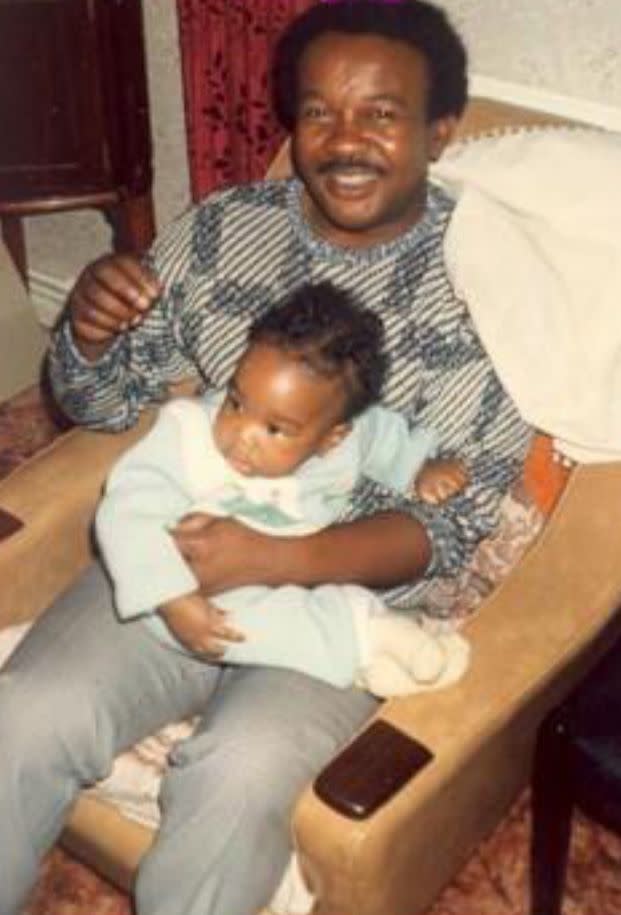
British Red Cross offers victims support
12:14 , Jacob Phillips
The British Red Cross has said it will continue to be there for those affected by the infected blood scandal.
In a statement, Lisa Hollins, executive director of UK operations at the British Red Cross, said:
“Our thoughts are with everyone affected by this tragedy as the Infected Blood Inquiry publishes its report."
“Our teams have been on hand throughout the Inquiry to offer people a safe, supportive space to talk about their feelings and experiences.
“This has made it possible for some people to voice things they haven’t been able to talk about anywhere else. Many had lived for years in secrecy and distress before calling us.
“The British Red Cross is there to support people in crisis and we will continue to be there for those affected as long as we are needed.”

 Yahoo News
Yahoo News 
